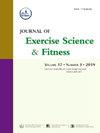A longitudinal study to COVID-19 infection among university students: Physical fitness changes and psychological responses
IF 2.4
2区 医学
Q2 SPORT SCIENCES
引用次数: 0
Abstract
Background
The impact of COVID-19 infection on physical and mental health of young adults remains unclear. This study aimed to investigate the changes in the physical fitness three months after recovering from acute COVID-19 infection, and examine if the infection could also influence the mental health of university students.
Methods
A total of 460 university students (mean age 18.9 ± 1.3 years, with 30 males and 27 females uninfected with COVID-19) volunteered for the study. Participants underwent a fitness test initially, followed by another physical fitness test and a mental health assessment three months after the infection of COVID-19. Physical fitness tests included body composition, flexibility, cardiorespiratory fitness, muscle strength, and muscular endurance. Mental health was assessed using the Depression-Anxiety-Stress Self-Assessment Scale (DASS-21), the Pittsburgh Sleep Quality Inventory (PSQI), and the Post-Traumatic Stress Disorder Self-Assessment Scale (PTSD).
Results
Three months after acute COVID-19 infection, the physical performance of university students had decreased compared to pre-infection levels by approximate 3–15 % (p < 0.05). Regarding mental health, a notable difference was observed in sleep quality, with the positive group scoring 19 % higher than the negative group (p < .05, d = .44). Sex (β = .164, p < .05), previous infection (β = .277, p = .019) and anxiety (β = .373, p = .002) were predictive of PSQI scores, accounting for 37.5 % of the variance.
Conclusions
All participants experienced a decline in physical fitness compared to their pre-infection levels, regardless of infection status. Those who had been infected exhibited poorer sleep quality compared to their non-infected peers. Prior COVID-19 infection and higher anxiety levels may contribute to poorer sleep quality.
大学生新冠肺炎感染的纵向研究:体质变化与心理反应
COVID-19感染对年轻人身心健康的影响尚不清楚。本研究旨在调查急性COVID-19感染后3个月的体质变化,并探讨感染是否也会影响大学生的心理健康。方法460名大学生(平均年龄18.9±1.3岁)自愿参加研究,其中男性30名,女性27名。参与者最初进行了体能测试,然后在感染COVID-19三个月后进行了另一次体能测试和心理健康评估。体能测试包括身体组成、柔韧性、心肺健康、肌肉力量和肌肉耐力。采用抑郁-焦虑-压力自评量表(DASS-21)、匹兹堡睡眠质量量表(PSQI)和创伤后应激障碍自评量表(PTSD)进行心理健康评估。结果急性COVID-19感染3个月后,大学生的身体机能与感染前相比下降了约3 - 15% (p <;0.05)。在心理健康方面,观察到睡眠质量的显著差异,积极组比消极组得分高19% (p <;.05, d = .44)。性别(β = .164, p <;.05)、既往感染(β = .277, p = 0.019)和焦虑(β = .373, p = 0.002)是PSQI评分的预测因子,占方差的37.5%。结论:与感染前相比,所有参与者的身体健康水平都有所下降,无论感染状况如何。与未受感染的同龄人相比,那些被感染的人表现出较差的睡眠质量。先前的COVID-19感染和较高的焦虑水平可能会导致睡眠质量下降。
本文章由计算机程序翻译,如有差异,请以英文原文为准。
求助全文
约1分钟内获得全文
求助全文
来源期刊
CiteScore
5.10
自引率
3.60%
发文量
54
审稿时长
31 days
期刊介绍:
The Journal of Exercise Science and Fitness is the official peer-reviewed journal of The Society of Chinese Scholars on Exercise Physiology and Fitness (SCSEPF), the Physical Fitness Association of Hong Kong, China (HKPFA), and the Hong Kong Association of Sports Medicine and Sports Science (HKASMSS). It is published twice a year, in June and December, by Elsevier.
The Journal accepts original investigations, comprehensive reviews, case studies and short communications on current topics in exercise science, physical fitness and physical education.

 求助内容:
求助内容: 应助结果提醒方式:
应助结果提醒方式:


